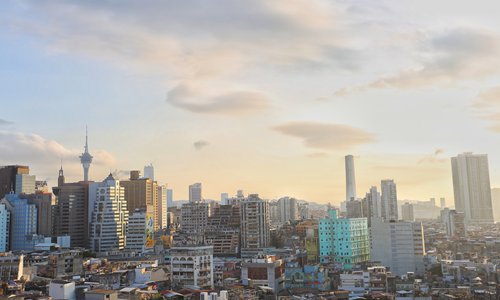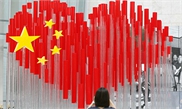
Photo: VCG
While Hong Kong is struggling from months of violent street protests, events in Macao, another special administrative region of China, are quickly leading the Greater Bay Area to new heights — from medicine to regional economic and cultural cooperation.
Leading up to this December 20, 2019's historic 20-year Macao handover anniversary from Portugal, the city is witnessing an acceleration of its diversification beyond the usual gambling economy.
This September, for example, witnessed the opening of the city's first medical school since the Portuguese settled here permanently in 1557. The new faculty of medicine at the Macau University of Science and Technology is primarily composed of local Macao students and will see more community and high-tech based simulation training for Macao and the Greater Bay Area.
Also, in September, the Guangdong Macao Traditional Medicine Park in Macao and on Hengqin island of Zhuhai held their annual meeting, sharing their collaboration with Portuguese speaking countries from Cape Verde to Mozambique, as well as to the Middle East and Europe. By embracing traditional medicine from China in Zhuhai in this way, Macao is illustrating a very warm embrace of its historic Chinese roots that extend back thousands of years—particularly of the region's glory years when the Greater Bay Area held the last court of the Southern Song Dynasty (1127-1279).
Indeed, imploring Chinese youths of this region to understand their ancient and glorious past is something that regional economic and cultural cooperation is being fostered to do from Macao — much more so than the basket of deplorable, social media driven fantasies of certain fanatical teeny-boppers in Hong Kong. In fact, many silent majority in Greater China view these teeny-boppers as monstrous vandals.
But back to peace. Earlier this year in February, meaningful regional and economic cooperation formats embraced education. This past February, Lin Shaochun, Executive Vice Governor of Guangdong Province announced the first ever Guangdong and Macao Cooperation Development Fund with RMB 20 billion. This increases the ability for students from Macao to attend over 50 colleges and universities across the province's key cities of Guangzhou, Shenzhen, Zhuhai, Foshan, Huizhou, Dongguan, Zhongshan, Jiangmen and Zhaoqing.
This was bolstered in September with the 2019 Guangzhou-Macao cooperation task force meeting held in Guangzhou. It was led by the Economic and Financial Secretary of the Macao SAR, Lionel Leong, and co-chaired by Chen Zhiying, Executive Vice Mayor of Guangzhou City. Three agreements were signed related to science and technology industries, cooperation between Guangzhou statistics bureau and the Macao statistics and census service, and the building of a new exhibition and trade center in Guangzhou's Nansha District for Portuguese-speaking countries and regions.
In fact, Macao is powerfully embracing its role of bridging these 70 million people of the Greater Bay Area globally, particularly to the Portuguese speaking world.
Back in February of this year, outgoing Macao Chief Executive Chui Sai On said, "Macao will continue to maximize its advantages as a global tourism and leisure center and service platform for trade cooperation between China and Portuguese-speaking countries to promote sustainable development and the performance of new industries with the aim of accelerating the proper diversification of its economy."
The incoming Chief Executive of the Macao SAR, Ho Iat Seng, called this period a "Golden Age" of cooperation between Portugal and China in June of this year. Ho has stated that the next government under him will intensify bilateral and multilateral cooperation to live up to the standards of the "one country, two systems" principle. In so doing, the Portuguese-speaking world will reap the benefits of the Belt and Road Initiative.
Overall, in these days when Hong Kong is becoming sick, Macao is becoming a beacon of great health with good medicine, from the first medical school to embracing its brothers and sisters with medicine and education across Guangdong, to its Portuguese-speaking cousins across the world.
When Macao celebrates the 20th anniversary of the handover in December, it will be clear to many that Macao has a new role in this region—and will for sure be aiming for new heights of history.
The author is editor of Peace Post (www.peacepost.asia) and South China Sea Magazine online (www.southchinasea.com.cn). opinion@globaltimes.com.cn


